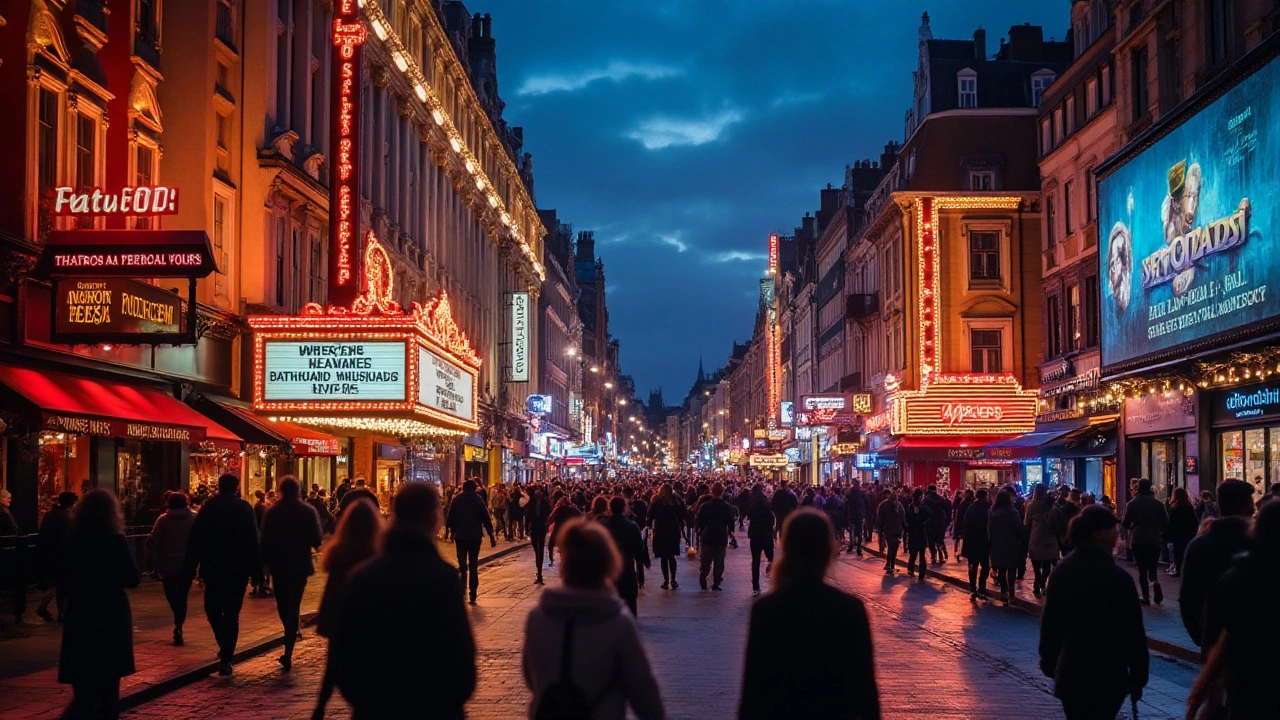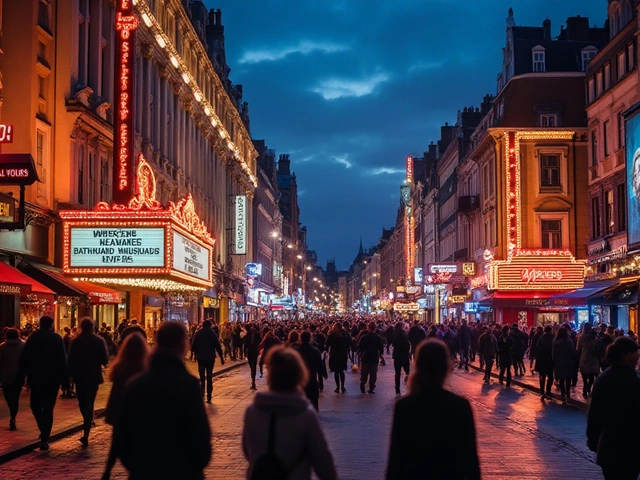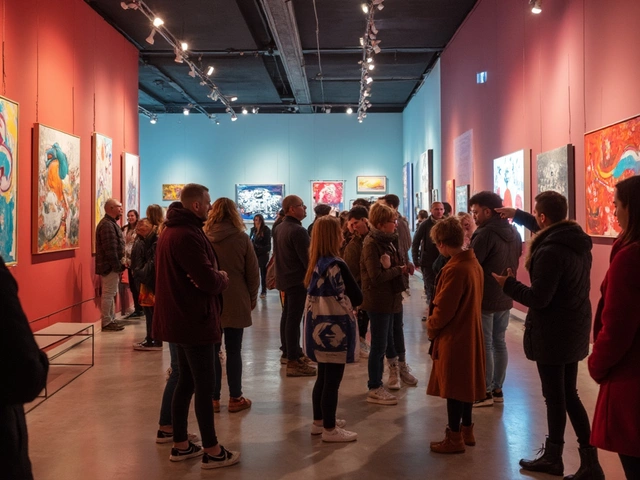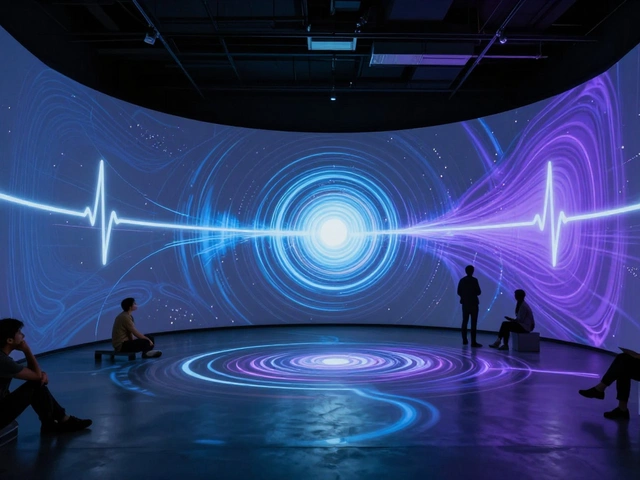Musicals have a unique way of weaving narratives through song and dance, and they've captivated audiences across generations. From Broadway to the silver screen, these stories have left lasting impressions in the world of entertainment. But among the countless productions, one stands as the most watched of all time. In this article, we're about to explore the journey of musicals throughout history, revealing which musical draws the largest crowds and why it remains an eternal favorite. Join the ride to uncover a tapestry of melodies, stories, and cultural magic that define this remarkable art form.
- The Magic of Musicals
- History of Popular Musicals
- The Most Watched Musical Revealed
- Cultural Impact and Influence
- Why Musicals Captivate Audiences
The Magic of Musicals
The world of musicals is a vibrant tapestry where melody and storytelling intertwine to create a unique form of art. This magical blend captures the essence of human emotions, turning everyday narratives into extraordinary spectacles. It’s not just about the music or the dance; it’s about how they come together to amplify the storyline's emotional depth. Broadway, especially, has been a hub where such enchanting tales come to life. Think of the timeless allure of shows like 'The Phantom of the Opera' and 'Les Misérables'. These productions not only encapsulate the magic of musicals with their remarkable scores and poignant stories but also endow viewers with a sense of wonder and introspection.
What makes this genre so enchanting is its ability to evoke raw emotions through powerful performances. The combination of captivating tunes and compelling lyrics often resonates deeply with audiences, making them a staple in global theater scenes. In fact, musicals often succeed in immersing the audience in their world, transforming a simple stage into an expansive universe of dreams and possibilities. This transformative aspect is fundamental to their enduring popularity. Moreover, musicals showcase a remarkable range of talent—from gifted actors and opera-grade singers to dancers who can express narratives through their graceful movements.
Musicals often explore diverse themes, from social justice to love and betrayal, each rendered with a complexity that invites audiences to ponder deeply on the subject matter. Hamilton, for instance, reimagines historical narrative through contemporary beats, altering the landscape of musicals with its unique approach. Stephen Sondheim, a legendary figure, once remarked on the versatility of musicals in capturing life’s contrasting elements, highlighting their transformative power.
Sondheim once said, "Musicals speak to humanity using its most universal language: music." This statement echoes the sentiment shared by many fans and creators alike.
In terms of pure numbers, musicals like 'The Lion King' boast some staggering viewership statistics. This is a testament not only to the story's appeal but also to how effectively musicals expand cultural boundaries, drawing people from various backgrounds. According to a recent survey, an estimated 21 million people have experienced this musical worldwide, making it one of history’s most-watched productions. A crucial factor in their widespread popularity is their ability to surprise and delight in ways no other form of theater can. What might seem like an abstract or dated tale is brought vividly to life with costumes that excite, songs that stay with you long after the curtain falls, and narratives that enter the collective consciousness.
Ultimately, what makes musicals truly magical is their unparalleled ability to connect with audiences through multiple sensory elements—aural, visual, and emotional. Whether you're witnessing a love story unfold or following more dramatic tales of conflict and resolution, musicals create experiences that linger long after the final note fades. These productions are not simply performances to observe but rather experiences that envelop the senses, transporting viewers to realms where reality is enhanced by the emotions of the stage. In this way, musicals continue to captivate audiences and retain their place as one of the most cherished forms of storytelling in the arts.
History of Popular Musicals
The journey through the world of musicals is as enchanting as the best stories they tell. Musicals have always been more than just performances; they are a window into various cultures and times. Their history can be traced back to the ancient Greeks, who incorporated music and dance in their plays. Yet, the modern-day musical as we recognize it took root in the flamboyant era of the 19th century, particularly in France and Europe, with operettas by composers like Jacques Offenbach and Johann Strauss II capturing public imagination. These European beginnings laid the groundwork for the transformative American musical theater that would later dominate the world stage. As the years rolled on, Broadway became a beacon for musical theater, offering a platform for production spectacles that combined arresting visuals, compelling acting, and unforgettable music.
One landmark moment in the history of musicals was the debut of 'The Black Crook' in 1866, often cited as the first piece of musical theater that combined a significant plot with music and dance in an elongated form similar to what we now consider the standard Broadway musical. The roaring twenties ushered in another golden era for Broadway as composers like Irving Berlin and Cole Porter brought a fresh vibrancy to musicals, with shows like 'Show Boat' introducing new themes and more complex characters. 'Show Boat' was groundbreaking, as it dealt with serious themes of racial prejudice which was unheard of at the time for a musical performance. It's often revered as one of the first to take musicals from being mere light-hearted performances into a realm of storytelling potential that could rival any theatrical or cinematic counterpart.
The history of popular musicals in the 20th century is marked by an ever-growing diversity in style and subject matter, greatly expanding the definition of what a musical can be. With the arrival of Rodgers and Hammerstein's 'Oklahoma!' in 1943, the integration of the musical elements—songs, dance, plot, and character development—reached new heights, setting a standard that would be difficult to surpass. 'Oklahoma!' demonstrated the power of storytelling through song, something that musicals after it strived to achieve. An iconic moment and transition happened with 'West Side Story' by Leonard Bernstein, which introduced robust realism and gritty subject matter drawn from Shakespearean roots, proving that musicals could effectively tackle the hardest of social issues while still entertaining the audience. As Broadway's influence grew, it birthed classics like 'The Sound of Music', 'My Fair Lady', and 'The King and I', each continuing the tradition of blending entertainment with meaningful stories.
One cannot overlook the operatic grandeur of Andrew Lloyd Webber's contributions in the latter part of the century. His works such as 'The Phantom of the Opera' and 'Cats' captivated millions with their emotional depth and set records for the length of time running on Broadway, demonstrating the universal appeal of musicals. As of 2023, 'The Phantom of the Opera' stands as the longest-running show in Broadway history. A new era dawned with the arrival of the Disney Renaissance, beginning with 'Beauty and the Beast' in the early '90s, tapping into a younger audience while enchanting older generations. These productions brought a fresh visual and aural splendor to the stage, aided by technological advancements that allowed for more ambitious set designs and special effects.
As Ben Brantley of The New York Times once remarked, "Musicals are a shared heartbeat, a city symphony," capturing the essence of how these productions were far more than mere entertainment; they resonated in the pulses of those who came to see thrilling tales unfold on stage.
In the modern era, the emergence of contemporary musicals like 'Hamilton' directed by Lin-Manuel Miranda marked a significant evolution. Incorporating hip-hop and rap alongside traditional musical styles, 'Hamilton' was not only a testament to the innovation within the genre but also a cultural phenomenon, captivating a global audience with its fresh take on America's founding fathers. This musical continues to redefine what's possible on stage, proving that the evolution of musicals is ongoing and marvelously dynamic. These stories, imbued with melody and movement, bridge generational gaps, bringing people together under the shared lights of the theater.
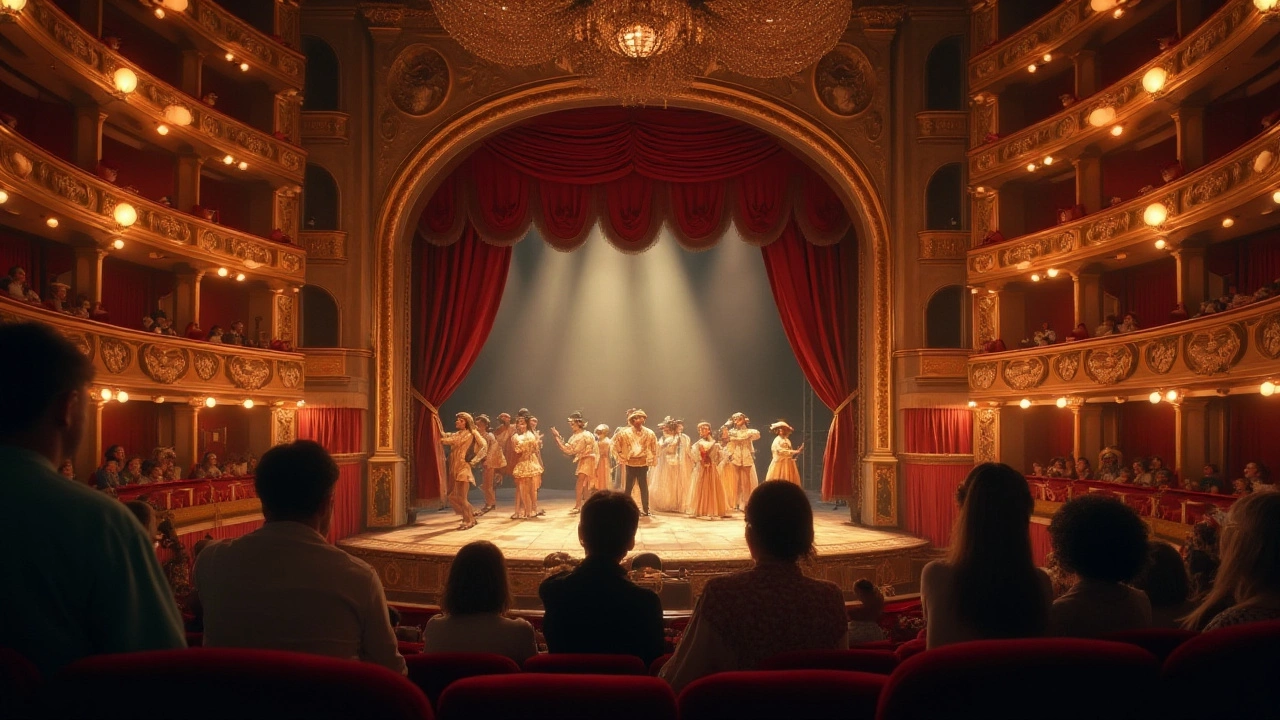
The Most Watched Musical Revealed
The title of the most watched musical ever goes, without much surprise, to the legendary "The Phantom of the Opera." Since its premiere in 1986, this Andrew Lloyd Webber masterpiece has shattered records and captivated audiences from all around the globe. Its haunting melodies, opulent sets, and the tragic tale of the disfigured musical genius living beneath the Paris Opera House have become an intrinsic part of both theater and popular culture. This timeless production has been played in over 35 countries, with staggering numbers estimating over 140 million people having witnessed its splendor live. A success story that not only spans decades but also countless adaptations and renditions.
What is it about "The Phantom of the Opera" that continues to draw such an audience? At its core, the story delves deep into the themes of love, obsession, and redemption, resonating with a universal audience. The musical's score is undeniably one of its greatest assets, featuring unforgettable numbers such as "The Music of the Night," and "All I Ask Of You." The deep emotional resonance and haunting beauty of Lloyd Webber's compositions are seamlessly complemented by the lush and atmospheric production design. The visual aesthetic, complete with its iconic chandelier scene, captures the grandeur and mystery perfectly.
"This musical is not just about spectacle, it is a deeply emotional and haunting love story," says theater critic Michael Billington. "It is that blend of story and splendor that makes it transcend generations."
Such a remarkable reach and impact could not be sustained through music and narrative alone. The dedicated and skilled casts that have, over the years, breathed life into these characters have contributed significantly to its ongoing appeal. Each performance brings a fresh perspective and nuance, keeping "The Phantom of the Opera" vibrant and ever-evolving. While this triumphant musical has dominated the theater circuits, it has also inspired numerous film adaptations, books, and various cultural references, continually cementing its place as the most watched musical of all time.
With performances still ongoing, the legacy of "The Phantom of the Opera" grows. Its powerful blend of storytelling and music keeps attracting new generations. While the musical landscape continues to evolve, this deeply immersive experience remains a landmark of theatrical success. And so long as there is an audience yearning to be swept away into a world of romance, mystery, and spectacle, "The Phantom of the Opera" will continue to be a beacon, a testament to the enduring magic of the musical realm.
Cultural Impact and Influence
From the bustling stages of Broadway to intimate theater halls around the world, musicals have continually shaped and been shaped by their cultural contexts. These vibrant performances do much more than entertain; they reflect societal issues, embody collective emotions, and often become symbolic of eras or movements. When considering the likes of "Les Misérables" or "The Phantom of the Opera," it’s easy to see how theater becomes a mirror to the human experience, offering insights into the struggles and triumphs of its time.
Historically, musicals served as a platform for social commentary and change. Productions like "West Side Story" tackled complex issues such as gang violence and racial tension, innovatively bringing these topics into the public discourse. The impact of musicals extends beyond the stage and invites audiences to reflect on personal and communal beliefs. As powerful narratives unfold, they have the potential to shift perceptions and inspire movements. This power was notably harnessed during the civil rights era in America, when shows conveyed messages of equality and hope. In fact, many believe these shows played a role in fostering empathy and understanding across dividing lines.
"Musicals have the unique ability to bring people together, teach them empathy, and ignite positive change." - Lin-Manuel Miranda
The influence of musicals is undeniable, leaving an indelible mark on the film industry, fashion, language, and vernacular but also reaching into other art forms such as literature and dance. Musicals like "The Sound of Music" not only entertained global audiences but also set new standards in filmmaking and soundtrack composition. Additionally, when a musical triumphs on stage, it often paves the way for adaptations, revivals, and imitations, keeping its legacy alive and relevant.
Impact on Public Perception and Norms
As the lines between culture and musicals blur, these performances have helped to redefine social norms. Productions depicting underrepresented stories or featuring diverse casts have gradually broadened the scope of mainstream cultural acceptance. Musicals have become catalysts for discussions about gender, identity, and politics, challenging audiences to interrogate their biases. Their reach is amplified when iconic musicals spawn adaptations onto television, digital platforms, or social media, ensuring that these once-niche interests reach unprecedented global audiences. They promote a culture of inclusivity and diversity while highlighting shared humanity.
An examination of the cultural influence of musicals also reveals changing audience expectations and consumption patterns. As technology and content delivery methods evolve, so too does the way we engage with musicals. Streaming phenomena such as "Hamilton" have showcased how digital access extends the boundaries of traditional theater, reaching countless homes worldwide and introducing the art to a new generation of fans. This democratization of access helps maintain the relevance and impact of musicals in society, as increased visibility fosters even greater demand for innovation and excellence in the industry.
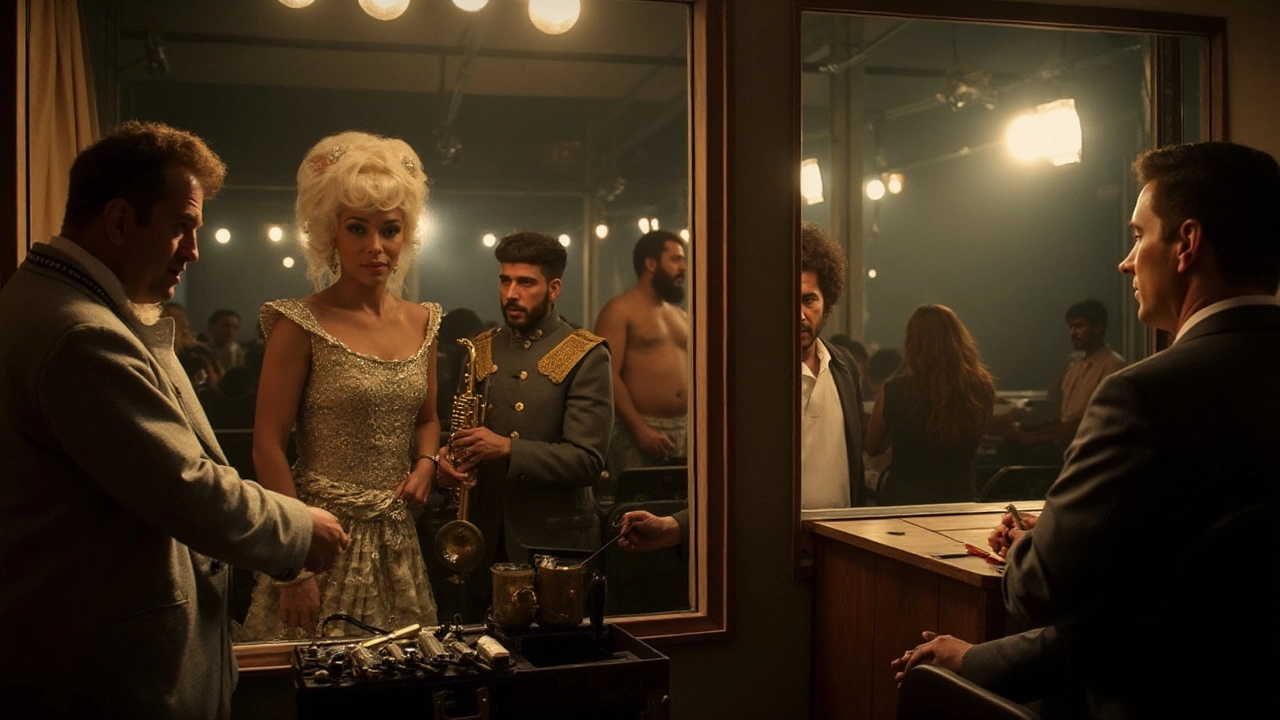
Why Musicals Captivate Audiences
There's something undeniably magical about musicals, a form of art that effortlessly blends powerful storytelling with brilliant melodies and vibrant choreography. It's a genre that has beautifully stood the test of time, continually enchanting audiences from all walks of life. But what is it that makes musicals so captivating? One key element is their ability to evoke a wide range of emotions. Whether it’s the joyous exuberance of an upbeat number or the heartstring-tugging vulnerability of a ballad, musicals have a unique way of resonating deeply with people’s personal experiences and emotions. This extraordinary ability to touch on universal themes, yet offer a deeply personal connection, makes the theater experience both intimate and grand.”
Equally intriguing is how musicals bring together a slew of creative talents, crafting an experience that stimulates all the senses. Consider the meticulously designed sets that transport you to a different era, the costumes that tell stories of their own, or the lighting that sets the mood and enhances the drama unfolding on stage. The art of musical theater is a glorious fusion of music, dance, and acting, and when these elements mesh perfectly, it’s an awe-inspiring spectacle. As the audience, one’s attention is wholly engaged, weaving through myriad emotions that mirror the human experience. Renowned composer Stephen Sondheim once said,
"Musicals have the power to reverse time and make you forget the world outside."This encapsulates the very essence of why musicals are so absorbing and impactful.
The communal nature of theater also plays a significant role in its allure. Attending a live performance with an audience is a shared experience, where collective intake of breath and spontaneous applause bind everyone in a shared emotional journey. This communal aspect fuels a unique energy, turning each performance into a singular event. Musicals also boast a unique ability to transcend language and cultural barriers through universal themes such as love, friendship, and human resilience. A story told through music, irrespective of the tongue it is sung in, can communicate beyond words. Musicals have found a way to address social issues and provoke thought, using catchy tunes to reach broader audiences, thus becoming a force for change and reflection within society.
Each musical offers insights into different worlds, sometimes mirroring our own challenges or depicting dreamlike fantasies, instilling hope and aspirations. The characters often embark on transformative journeys, and witnessing their growth can inspire audiences to chase their own dreams or face their fears. There's a transformative element intrinsic to musicals that speaks to the essence of human nature - our desire to belong, to love, to dream, and most importantly, to express. This expressive nature of musical theater speaks volumes of its enduring appeal, offering escape, solace, laughter, and food for thought all in one neat package. While trends in entertainment shift continuously, the timeless charm and multifaceted nature of musicals ensure their ongoing relevance and ability to captivate audiences.
